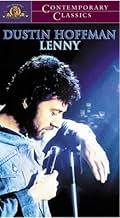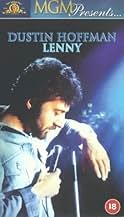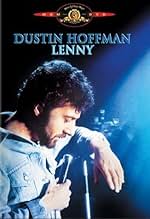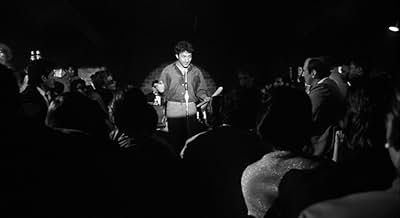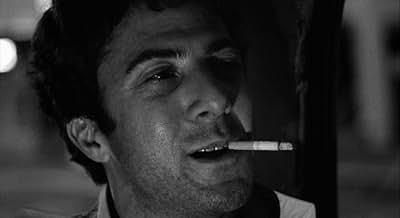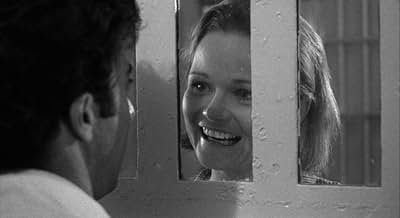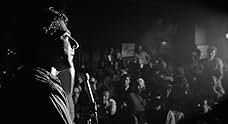अपनी भाषा में प्लॉट जोड़ेंThe story of acerbic 1960s comic Lenny Bruce, whose groundbreaking, no-holds-barred style and social commentary was often deemed by the Establishment as too obscene for the public.The story of acerbic 1960s comic Lenny Bruce, whose groundbreaking, no-holds-barred style and social commentary was often deemed by the Establishment as too obscene for the public.The story of acerbic 1960s comic Lenny Bruce, whose groundbreaking, no-holds-barred style and social commentary was often deemed by the Establishment as too obscene for the public.
- 6 ऑस्कर के लिए नामांकित
- 7 जीत और कुल 17 नामांकन
- Girl
- (as Kathie Witt)
- Hawaiian Judge
- (as Monroe Meyers)
फ़ीचर्ड समीक्षाएं
Made in a fairly familiar quasi-documentary style, 'Lenny' begins with 'present day' (i.e. 1974) interviews with the surviving characters from Lenny's life, cut with flashbacks to his 1950's beginnings as a 'traditional' comic, and 'late' live performances in his post-drug-bust days. As the film progresses and the narrative catches up with the interviews, the gaps between these segments 'close'. Clever use is made of some of Lenny's material, cutting from keywords or phrases in his bits, to events in his life with inspired or correlated to them.
All the same there is something a little dry and disappointing in the film's structure: almost as if it could have used a more conventional, linear narrative, like Milos Forman's tribute to Andy Kauffman, 'Man on the Moon' would use to such great effect 25 years later.
Ironically though, such a structure might have deprived of us of seeing more of Hoffman doing Lenny's bits 'live' on stage - and for me these were the highlights, which I wish had lasted longer, rather than flashing back to some past event after 30 seconds. As a big Lenny Bruce fan, I can only say that Hoffman's portrayal is almost supernatural. It's like he's channeling the guy. He has his mannerisms and improvisational style down perfectly. You would swear you were seeing these improvisations for the first time if you hadn't heard them already. In fact, Hoffman possibly even improves on Lenny's delivery in one small respect. Lenny had a penchant for the 'conversation' that would erupt in the middle of one of his bits, between two or more characters. Hoffman probably puts a bit more distinction between the characters than Lenny often did (quite often they would all just sound like Lenny, which was part of the magic, but never mind.) Over 30 years on, it's quite amazing to me that this film has become a relative obscurity in Dustin Hoffman's filmography. Frankly, though Hoffman has blown me away on various occasions, I don't ever remember being more blown away than this. And if you were to pick easy people to imitate, I doubt Lenny Bruce on stage would be high on many people's lists.
The film as a whole is good, but to witness Hoffman channeling Bruce, it's a must-see.
Lenny starts out trying to do bits like any other comic of the day - the early 50s, and he fails at it. He then starts to do more commentary on the human condition as stand-up, and that's where he hits his mark. Especially at a time of great societal change like the late 50s/early 60s. Today, that's the stuff of pretty much all stand-up comics, so it's hard to appreciate just how ground-breaking it was at the time. It's like trying to appreciate how ground-breaking "Citizen Kane" was in 1941. It's still an interesting film, but it's just impossible to appreciate it as next-level filmmaking like it was at the time.
My big takeaway was that director Bob Fosse really knows how to tell a story with editing. There are sequences in all of his movies where I would say, 'Wow,' just to an editing choice. Lenny impressed me the most in that regard. As for Valerie Perrine as Lenny's wife - I think that had she been up for Best Supporting Actress Oscar instead of Best Actress, she would have won that category. She was striking as a woman who went along with the choices that her husband made for the both of them with not much if any input from her, and later got blamed by him and society for that matter for going along with those choices. In that regard, she was a more conventional wife of the 1950s than you would think.
It is a fascinating film though, in its own way. Fosse uses a documentary-like approach, complete with black and white photography and a narrative device in which we see Bruce's long-suffering love (played heartbreakingly by Valerie Perrine, Lex Luthor's bikini-clad girlfriend in "Superman" [1978]) telling Bruce's story to a filmmaker while the actual events themselves are played out as flashbacks. Fosse was fond of this confessional type of storytelling and would use it again in "All That Jazz" (1979). Dustin Hoffman is simply sensational as Bruce; he utterly disappears into this caustic character until no trace of Hoffman the actor is left. Technically, everything about the film is highly accomplished, but it's so desolately grim as to be off putting.
Grade: B+
**** (out of 4)
Bob Fosse's masterpiece takes a look at the short life of comic Lenny Bruce (Dustin Hoffman) who would die at the age of forty but not before breaking down certain doors for future comics. The film follows his rise up through the ranks thanks in large part to the controversy that followed him due to the nature of his act. I've always felt that LENNY was one of the best movies of the decade and even after all these years it's still a very sharp, at times funny but mostly sad look at a man who deserved much better than he ever got. There's no doubt in my mind that the film was like the light shining from above on both Fosse and Hoffman as the two were perfectly meant to bring this film to the screen and boy do they really deliver. Fosse's style here wouldn't work with most directors but the way he uses it to get to the emotion and power in the story is quite amazing. The film jumps back and forth through different periods of Bruce's life and the way Fosse uses this to build up the subject is something interesting to watch. Just take a look at a rather innocent scene where Bruce talks his wife into having a threesome with another woman. Just look at how the silence is used and the impact this has for this scene. Hoffman gives one of his greatest performances here, which is saying quite a bit considering how great he was during this period of his career. I thought he really did a remarkable job at not copying the real Lenny Bruce but instead taking him and forming him into this character. I thought Hoffman really gave an incredibly powerful and emotional performance and especially as Bruce begins to crack due to the pressures of the courts and the drugs. Valerie Perrine is also excellent in her role of Bruce's drug addicted wife. The B&W cinematography is some of the greatest you're ever going to see. This is certainly one of the most beautiful films you're ever going to see and especially the way the lighting is even in the simplest scenes. LENNY often gets beaten up by some critics because it's not 100% accurate but I've yet to see any bio pic that is. To me this is clearly one of the best movies of the decade and features one of the greatest performances you're going to see.
क्या आपको पता है
- ट्रिवियाThe scene in which Lenny Bruce does his act in a raincoat, near the movie's end, came from a Lenny Bruce show that a student tape-recorded and sent to Dustin Hoffman. Bruce's lines are directly from the tape.
- गूफ़During the movie's opening monologue, Lenny says that it's 1964 and then references Jerry Lewis's MDA Telethon, which debuted in 1966.
- भाव
Lenny Bruce: What's the worst thing you can say to anybody? ''Fuck you, mister!'' That's really weird, because if l wanted to hurt you, l should say, ''Unfuck you, mister'' Because ''fuck you'' is really nice, man.
- कनेक्शनFeatured in Precious Images (1986)
टॉप पसंद
- How long is Lenny?Alexa द्वारा संचालित
विवरण
बॉक्स ऑफ़िस
- बजट
- $27,00,000(अनुमानित)
- चलने की अवधि1 घंटा 51 मिनट
- रंग
- ध्वनि मिश्रण
- पक्ष अनुपात
- 1.85 : 1
इस पेज में योगदान दें



